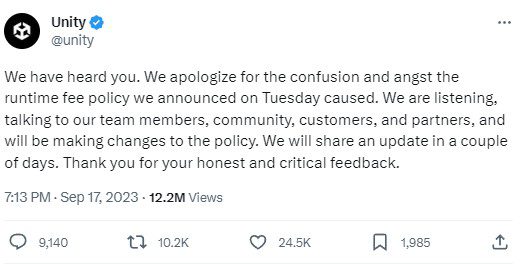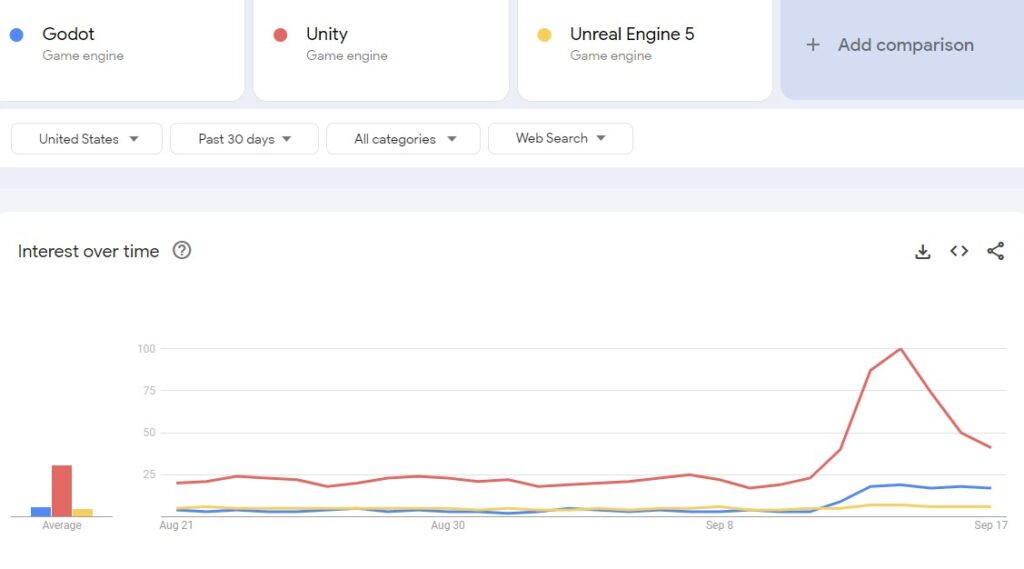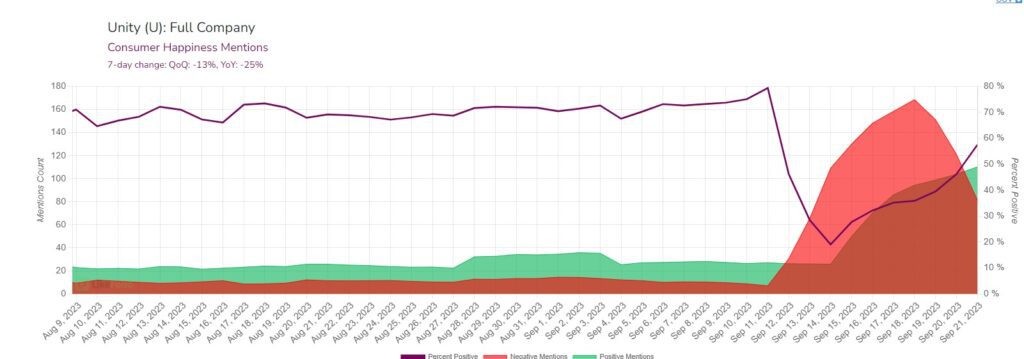Another week of earnings season! Here are 5 names that […]
Is Unity the next Snapchat?
Remember when Snapchat unrolled a massive redesign in 2018, and everyone hated it? (Let us jog your memory.)
Users were so mad they left the app, and Snapchat’s stock took a nosedive.
Lately it feels like we’re on the brink of a repeat, this time with Unity Software.
The company just rolled out updates…and it’s not going down well.
Users are furious. And it’s got us wondering: Is the company heading for a Snapchat-style crash and burn in the stock market?
Here’s what’s going on…
Unity Introduces “Runtime” Fee
Unity Software recently announced a price increase that has sparked significant backlash from the video game development community.
The primary concern revolves around the new pricing model for the Unity Engine, a foundational software for many popular games like "Pokemon Go”.
Starting next year, developers who utilize Unity's free tier for game creation will be charged $0.20 for each download and installation of their game once it surpasses 200,000 downloads and accumulates $200,000 in revenue.
This is a departure from the previous model where the Unity Engine was available for free and sustained by higher-tier subscription services and an integrated ad platform.
The affordability of Unity has been instrumental in the success of several hit titles, and many developers have expressed concerns that the proposed fee model would detrimentally impact game studios of varying scales and budgets.
A significant worry is the potential misuse of this model, akin to "review bombing." This refers to the coordinated effort to flood games with negative reviews, often targeting games that feature progressive elements. Rami Ismail, a game developer, highlighted that developers advocating for inclusivity and diversity are particularly vulnerable to such malicious tactics.
Unity responded to the concerns by clarifying certain aspects of their new model. They stated that only the initial installation would incur a charge, and multiple reinstallations wouldn't count towards the fee. Games offered as part of subscription services, like Xbox Game Pass, would be exempt from these fees, but the distributors, such as Microsoft, would bear the cost.
Unity's executive, Marc Whitten, mentioned that only about 10% of Unity's developers would be affected by the new fees, considering the set thresholds.
Amidst the controversy, Unity announced its intention to revise the policy and promised to provide updates soon.

So – where do we take it from here?
Bearish Case for Unity
Unity’s move to introduce a runtime fee suggests a potential desperation for revenue growth.
Additionally, significant insider selling by key company figures, including the CEO, hints at a lack of confidence in Unity's future. Furthermore, Unity's collaboration with Apple on spatial reality apps for the Vision Pro headset is in jeopardy, with Apple reportedly reducing its production orders, indicating a potential miscalculation of its market appeal.
These factors collectively raise concerns about Unity's growth and stock trajectory.
Bullish Case for Unity
Unity has proven it is willing to listen to developer feedback. For instance, Unity has already provided clarity that it will only charge developers when a user first installs a game, which addresses concerns related to “install bombing.”
In addition, by introducing the runtime fee, Unity is exploring new avenues for revenue. This could lead to a more diversified and stable income, especially from high-performing games that achieve significant downloads and revenue.
While the immediate reaction to the runtime fee has been negative, if Unity can effectively communicate the value and benefits of this change to developers and offer added services or features, it might be able to turn the tide in their favor.
LikeFolio Case for Unity
The best news for investors is that LikeFolio is listening to consumer reaction in real time. Currently we’re monitoring to determine mass exodus with lingering consequences, as was the case with Snapchat. Or another flash in the pan incident, like one we saw with Reddit earlier this year.
Here’s what we know so far:
- “Unity alternative” searches surged upon the company’s announcement.
Many users are already exploring other free options, like Godot:

These indie-based developers appear to be exploring Godot, a cross-platform, free and open-source game engine vs. other alternatives like Unreal Engine 5.

- Consumer Happiness took a Hit
Unity sentiment plunged from 80% positive to 19% positive in a matter of days. Ouch.

The bright side: it is showing signs of recovery, climbing above 57% positive yesterday.
Company buzz spiked alongside sentiment, but also appears to be recovering.

3. Unity Web Visits Spiked

This suggests a large swath of users seeking additional information.
If buzz, sentiment and web visits stabilize over the next 2 weeks, it could be a very Bullish indicator that the company’s decision wasn’t enough to push users off the ledge.
But if web visits, mentions and sentiment settle lower, that spells signs of trouble ahead.
We’ll be watching in real-time, and will provide an update for members when the dust settles.
